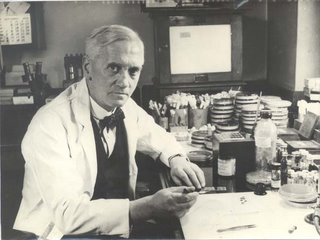The Fleming Myth

No one can underestimate the value of the antibiotic penicillin once it was unleashed on wartime infections in 1941: it has saved millions of lives, reducing the risk of infection associated with surgery and combating the mortal power of diseases such as pneumonia and meningitis. Alexander Fleming, its discoverer, was awarded the Nobel Prize for Medicine in 1945, and lauded as an instant celebrity, the world’s great genius.
In truth, Fleming was an adequate researcher with good common sense who had gained a solid reputation as a bacteriologist, publishing useful if ordinary journal articles on diseases such as acne and syphilis. In 1921 he studied his own nasal mucus and discovered that it contained lysozyme, an enzyme which ate bacteria without destroying living tissue. The only problem was that it did not seem to kill the bacteria associated with the post-nasal drip itself. Although the substance was later isolated by others and put to good use, Fleming himself let the matter sit.
In 1928, he was working with staphylococcus and noticed that some kind of mold (introduced accidentally while he was away on vacation) was killing off the bacteria in one of his laboratory petri dishes. The mold turned out to be something known as "penicillium," and was being grown for other research purposes on another floor in his building. Fleming named the antibacterial substance "penicillin," performed a few experiments using live animals and published an article on it, but failed to grasp the full importance of it.
In 1935, however, Howard Florey and Ernst Chain read Fleming’s article and for several years tested penicillin in their quest for an effective antibacterial agent. After confirming its power, they put it into mass production. Fleming, meanwhile, had been laboring away in obscurity when news of the great discovery hit the airwaves, and much to the surprise of Florey and Chain, paid a call on them in 1940 -- by which time Chain had assumed that Fleming was probably deceased. Chain did not hear from Fleming again until 2 years later, when Fleming wrote to him requesting some penicillin for a friend suffering from meningitis, along with instructions for the proper use of the antibiotic.
Enthusiastic reporters eventually seized on the story of the unknown, unpretentious Scot and, coupled with the mass adulation that the effectiveness of penicillin itself inspired, turned Fleming into a superstar. Florey and Chain shared in the Nobel Prize, but not in the celebrity. For his own part, Fleming was painfully aware of the exaggerated claims made for him in the press, and kept a scrapbook which he sardonically entitled "The Fleming Myth."
Sir Alexander Fleming, who was knighted in 1944, was born on this day in 1881 in Lochfield, Ayrshire, Scotland, and died on March 11, 1955.
Labels: Biologists and Physiologists





0 Comments:
Post a Comment
Subscribe to Post Comments [Atom]
<< Home